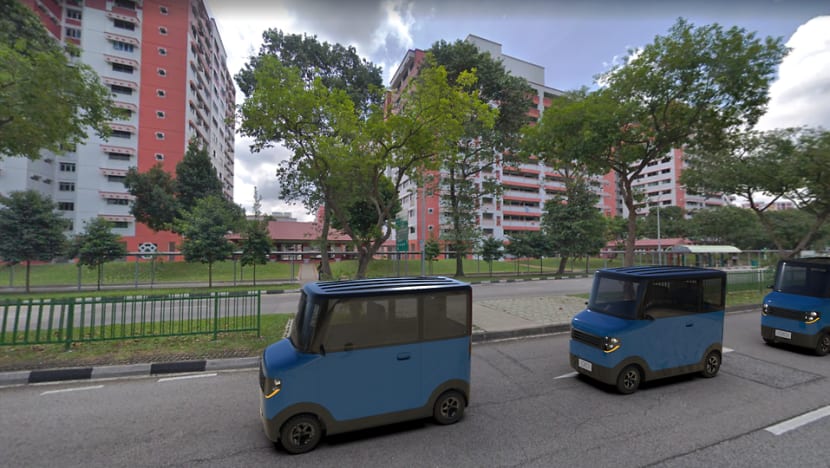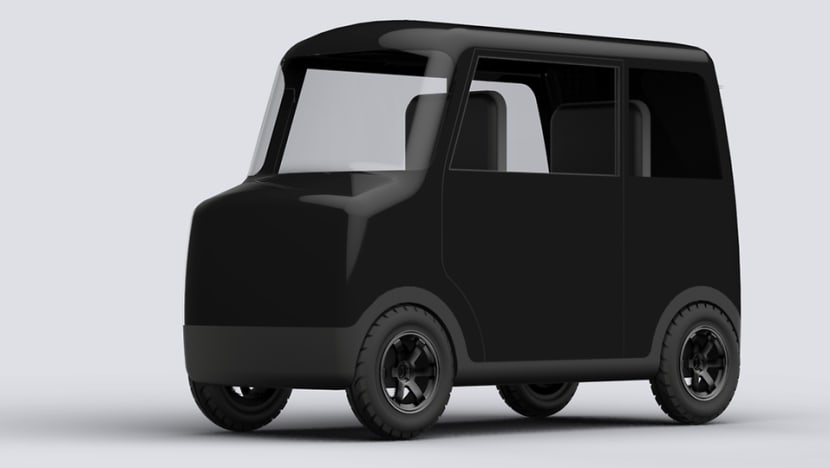Singapore start-up QIQ aims to roll out shared electric microcars for last-mile trips

An artist impression of QIQ Pods moving in platooning formation. (Photo: QIQ Global)
SINGAPORE: Come next year, some commuters may be able to make the last-mile journey between their home and the MRT station in a small, two-seater electric car.
Singapore firm QIQ Global plans to launch the microcars for hire. Dubbed the QIQ Pod, it will be no bigger than 2.4m long and 1m wide.
The concept is similar to the shared electric vehicles currently offered by BlueSG, said QIQ Global chief executive and co-founder Justin Sim.
Mr Sim told CNA he believes there is demand for such vehicles, especially in towns such as Punggol.
“For a lot of the residents in Punggol, they are still required to take a feeder service or to walk a long distance to reach the LRT (Light Rail Transit) station,” he said, adding that there is still “a lot of inefficiency” in the town’s public transport network.
QIQ Global, which operates about 400 e-bikes and e-scooters in Hanoi, had previously expressed interest in Singapore's now-suspended shared e-scooter scheme.
Mr Sim said he hopes the QIQ Pod will be the company's flagship product moving forward, and plans to introduce between 300 and 600 microcars in Punggol.
The company intends to launch a trial by next year, he said, adding that it is in discussions with two companies in the transportation and logistics industries.
READ: 28,000 charging stations for electric cars is possible - but where? Industry players weigh in
To ensure that the vehicles are used for short trips, Mr Sim said there will be geo-fencing, which uses GPS or radio frequency identification technology to create a virtual geographic boundary.
Unlike BlueSG cars which need to be parked at charging stations, QIQ Global intends for its microcars to be able to autonomously direct themselves to park at the nearest charging station.
"It's so easy to drive you don't even need to learn how to park the car," said Mr Sim. "When you end the ride, you leave it by the curbside and it will park by itself."
It also aims to employ a method called platooning, which involves a human-driven car leading a convoy of driverless cars using wireless communications. This would cut down on the number of people needed to distribute the cars to areas where they are needed.

During off-peak hours, drivers would be able to use the QIQ Pods to perform deliveries, maximising the use of these vehicles, said Mr Sim.
It would likely cost S$2 for an ad hoc ride lasting 30 minutes, and between S$30 and S$50 per month to use the QIQ Pod multiple times daily, he added.
Those using it for logistics purposes would have to pay a monthly fee of about S$180 to S$240, Mr Sim said.
READ: Commentary: Electric vehicles will take over Singapore. But here’s what must happen first
In 2014, a similar microcar by Renault made headlines after the French automaker wanted to get it approved for use here as a motorcycle.
However, the Land Transport Authority said at the time that the Renault Twizy - a two-seater, four-wheeled electric vehicle described as a hybrid between a car and a motorcycle - did not fit into any existing vehicle classification, and had asked the manufacturer for more details.
The Twizy had a top speed of 80kmh and weighed 474kg, but under Singapore’s Road Traffic Act, a motorcycle must have fewer than four wheels and weigh no more than 400kg.
The Twizy was never made commercially available in Singapore.
Mr Sim said he is “pretty confident” that unlike the Twizy, the QIQ Pod will be able to get the approval of local authorities, pointing to the vehicle’s weight of no more than 250kg and top speed of 40kmh.
“Actually we have a lot to thank the Renault Twizy for,” he said.
However, transport economist Walter Theseira from the Singapore University of Social Sciences believes that microcars have limited appeal, saying that as these vehicles are likely to take up an entire road lane, they will have little impact on reducing congestion.
“Big car manufacturers like Daimler tried to move on this decades ago,” he said, pointing to Smart, the unprofitable microcar division of the German automaker.
“In the end it didn’t take off because cities just aren’t built for microcars.”
Earlier this year, it was announced that Smart was being relaunched as a joint venture between Daimler and Chinese car manufacturer Geely.
Associate Professor Theseira also said there are questions surrounding the potential use of the QIQ Pod as a delivery vehicle.
“The question is the productivity gains versus the current alternatives, which range from standard cargo vehicles for larger scale deliveries to human-powered bicycles and just walking for smaller deliveries,” he said.
“This device appears to fit somewhere into the lower end of this, but can it be more efficient than bicycles and motorcycles to justify the cost?”















